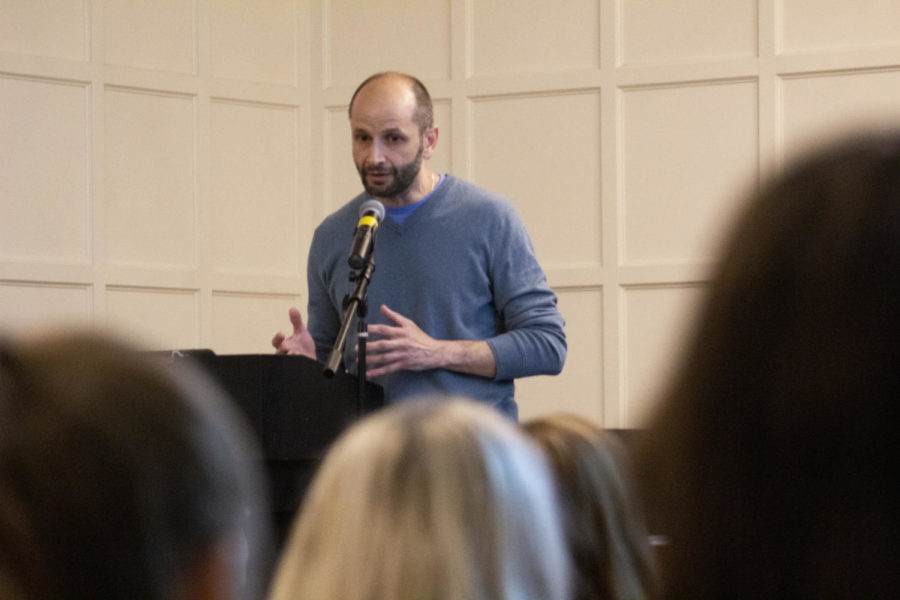Panel touches on experiences of children growing up in war-torn countries
Kennedy DeRaedt/Iowa State Daily
Jean-Pierre Taoutel, a senior lecturer of French at Iowa State led and moderated the discussion, “Children at War: Born into a War Zone.” The discussion was interactive and had attendees talk in small groups to answer questions like, “How do you provide education in wartime?” and “How does war impact children’s health?” The panel was held on Nov. 27 in the Cardinal Room at the Memorial Union.
November 27, 2018
An interactive panel led by Jean-Pierre Taoutel, a senior lecturer of French at Iowa State, shared stories and awareness about children in war Tuesday evening. The panel, “Children at War: Born into a War Zone,” took place in the Cardinal Room of the Memorial Union.
The three panelists at the event were Taoutel; Abdul Issa, a senior in chemical engineering; and Faizul Jasmi, a senior in software engineering.
The panelists used images of bloodied and dying children in Syria and Yemen to illustrate the horror that children experience.
Taoutel, born in Syria and raised in Lebanon, talked about his past in a war-torn country and how it affected him.
He spoke primarily on his 15 years in Beirut, Lebanon — a war zone in the Lebanese Civil War.
“I remember seeing a truck driving by filled with dead bodies,” Taoutel said, explaining the atrocities he experienced. He said his younger brother knew nothing but war and didn’t know peace existed in other places of the world.
Taoutel touched on his experience of doing homework in the basement by candlelight while bombs dropped outside.
He explained how centers opened to provide education to small groups of the city when there was no bombardment. Teachers never slept at night and came to school tired. Classes like music were cut because they weren’t considered important enough, he recalled.
“I appreciate life more, I didn’t have a childhood but I want one now,” Taoutel said about his 15 year experience in Lebanon.
The main focus for the panelists was engaging with the audience and finding a solution with them about the issues of education and health.
“During wartime, there isn’t school, so how can we still have education?” Taoutel asked the audience.
Jasmi spent his time at the podium explaining how war impacts children’s health and nutrition. Some facts he presented included that 5.6 million children in Syria struggle to get proper health care, 5 million children in Yemen are starving due to inflated prices of food and reduction in crop production, and in a refugee camp, 119 children had heart disease, but only 28 life-saving operations were done.
Jasmi explained to the audience that often times in war zones hospitals and water facilities are attacked to cause health problems for the areas inhabitants.
He also said when there are reductions in crop production families have to resort to eating grass when food is scarce.
“Even when sending food in good faith, it often times never gets to the people,” Taoutel said.
When Issa spoke he brought up many points about mental health and how it affects children in war zones.
“Mental health is a very serious issue that affects everyone involved,” Issa said.
30 percent of children in war zones experience mental health issues, mainly PTSD and depression, things commonly associated with soldiers, Issa said.
Issa explained that mental illness is stigmatized and often not reported.
The three panelists went on to talk about steps the audience can take to lessen the effect of war on children.
The first step was mitigation, which included supporting nonprofit organizations and providing physical and mental rehabilitation for refugees. The second step was prevention, meaning using protests and petitions to contest the spread of war.
Taoutel brought up Amnesty International and Human Rights Watch, two groups known for making a difference for the populace of war-torn countries.
“Forget about borders and countries, the world belongs to all, and eventually there is going to be a war where we are all affected. How can we protect ourselves then when we don’t protect others now,” said Beulah Kure, an open-option freshman, when explaining the importance of the lecture.







